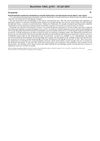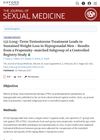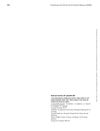 28 citations,
May 2013 in “The Journal of Steroid Biochemistry and Molecular Biology”
28 citations,
May 2013 in “The Journal of Steroid Biochemistry and Molecular Biology” Testosterone therapy can improve sexual desire and function in postmenopausal women but should be used cautiously and not based solely on testosterone levels.
 36 citations,
January 2014 in “The Journal of Sexual Medicine”
36 citations,
January 2014 in “The Journal of Sexual Medicine” Testosterone may help increase sexual events for women with low libido due to antidepressants.
 1 citations,
August 2015 in “Current Sexual Health Reports”
1 citations,
August 2015 in “Current Sexual Health Reports” 5α-reductase inhibitors can cause serious and possibly lasting sexual and psychological side effects.
[object Object]  23 citations,
January 2003 in “Journal of Pediatric Endocrinology and Metabolism”
23 citations,
January 2003 in “Journal of Pediatric Endocrinology and Metabolism” About 15% of US Army personnel use hair products containing hormone or placenta, with higher usage among non-whites, females, and enlisted personnel.

Participating in Sexual Orientation Change Efforts may increase the risk of suicide for sexual minority individuals.
 15 citations,
March 2020 in “Anais Brasileiros De Dermatologia”
15 citations,
March 2020 in “Anais Brasileiros De Dermatologia” Finasteride may cause lasting sexual, mental, and physical symptoms; use with caution.
 11 citations,
August 2019 in “The Journal of Sexual Medicine”
11 citations,
August 2019 in “The Journal of Sexual Medicine” Women with nonclassic congenital adrenal hyperplasia experience more sexual dysfunction and distress.
September 2022 in “Translational Andrology and Urology” Finasteride may cause lasting sexual and mental health issues, and genetic screening could help prevent them.
Public awareness of finasteride's sexual side effects has increased, suggesting healthcare providers should discuss these risks more thoroughly with patients.
8 citations,
October 2021 in “The international journal of risk and safety in medicine” The document sets criteria for diagnosing long-term sexual dysfunctions caused by certain medications.
 February 2018 in “The Journal of Sexual Medicine”
February 2018 in “The Journal of Sexual Medicine” Natesto nasal gel improves erectile function and mood in men with low testosterone within 30 days.
April 2020 in “The FASEB Journal” Finasteride may cause lasting sexual issues by altering specific genes in human cells.
 43 citations,
January 2016 in “International Journal of Andrology”
43 citations,
January 2016 in “International Journal of Andrology” Finasteride caused long-term sexual and non-sexual side effects in young men with hair loss.
 December 2016 in “The Journal of Sexual Medicine”
December 2016 in “The Journal of Sexual Medicine” Short-acting testosterone injections in a clinic are a preferred treatment for low testosterone because they work well, are convenient, and patients stick with the treatment.
 February 2010 in “Journal of The American Academy of Dermatology”
February 2010 in “Journal of The American Academy of Dermatology” Ustekinumab significantly improved sexual function and quality of life for people with moderate to severe psoriasis.
 May 2016 in “The Journal of Sexual Medicine”
May 2016 in “The Journal of Sexual Medicine”  29 citations,
July 2013 in “The Journal of Sexual Medicine”
29 citations,
July 2013 in “The Journal of Sexual Medicine” Testing for CAG repeat polymorphism in the androgen receptor gene is not currently recommended for managing hypogonadism.
 1 citations,
February 2017 in “Journal of Aesthetic Nursing”
1 citations,
February 2017 in “Journal of Aesthetic Nursing” Men are getting more beard transplants to look better and follow fashion trends.
 July 2021 in “Reactions Weekly”
July 2021 in “Reactions Weekly” Man experienced lasting sexual dysfunction from finasteride, but malpractice claim was rejected.
 February 2017 in “The Journal of Sexual Medicine”
February 2017 in “The Journal of Sexual Medicine” Long-term testosterone treatment helps men with low testosterone levels lose weight.
 48 citations,
July 2009 in “The Journal of Sexual Medicine”
48 citations,
July 2009 in “The Journal of Sexual Medicine” DHEA did not improve sexual function, well-being, or menopausal symptoms in postmenopausal women with low libido but caused side effects like acne and increased facial hair.
[object Object]  5 citations,
June 2004 in “The Journal of The British Menopause Society”
5 citations,
June 2004 in “The Journal of The British Menopause Society” Testosterone therapy can improve sexual satisfaction and mood in surgically menopausal women when used with estrogen, but its long-term safety and effects on naturally menopausal and premenopausal women are unclear.
 2 citations,
March 2004 in “Reviews in Gynaecological Practice”
2 citations,
March 2004 in “Reviews in Gynaecological Practice” Hormonal changes and psychological issues can cause sexual dysfunction in postmenopausal women. Behavioral therapy is recommended first, with hormone replacement helping some symptoms but not libido. Testosterone can improve libido, but its effects on overall sexual function are unclear. Emotional and relationship issues should be addressed before using medication, and the benefits and risks of testosterone supplementation should be considered.
 177 citations,
July 2004 in “The Journal of Sexual Medicine”
177 citations,
July 2004 in “The Journal of Sexual Medicine” Experts recommend thorough medical, sexual, and psychosocial assessments for women's sexual dysfunctions, and suggest individualized treatment plans with regular check-ups. They also mention potential use of estrogen and androgen therapy, but with caution due to safety concerns.
 393 citations,
November 2000 in “Archives of General Psychiatry”
393 citations,
November 2000 in “Archives of General Psychiatry” Testosterone is important for men's sexual function, may help some women's sexual desire, while other hormones and neurotransmitters also play complex roles in sexual behavior.
May 2023 in “The Journal of Sexual Medicine” Men with self-diagnosed PFS-related ED have normal erectile hemodynamics.
 40 citations,
April 2018 in “Endocrine”
40 citations,
April 2018 in “Endocrine” PFS and PSSD are similar conditions with persistent sexual dysfunction after stopping medication.
 January 2023 in “Brazilian Journals Editora eBooks”
January 2023 in “Brazilian Journals Editora eBooks” Passiflora incarnata may help with anxiety but has risks and drug interactions.
There's a genetic link between Fragile X Syndrome and Autism Spectrum Disorder.
6.7% of urine cultures showed hospital-acquired urinary tract infections.
Children used screens more during COVID-19, causing various health complaints.
Autism Spectrum Disorder is often underdiagnosed in females.
Dissociative disorders in childhood sexual abuse victims are more common in males.
Most pregnant teenagers are not dissatisfied with their body image but worry about weight.
Diagnosing tuberculosis after knee surgery is challenging due to non-specific symptoms.
Post-COVID-19 syndrome is more common in older, severely affected patients.
Psychiatrists should be part of pain management teams due to the psychological aspects of pain.
 February 2024 in “The journal of sexual medicine”
February 2024 in “The journal of sexual medicine” Flibanserin shows promise for treating male sexual dysfunction but has side effects like insomnia and fatigue.
May 2023 in “The Journal of Sexual Medicine” Flibanserin may help improve sexual symptoms in various conditions beyond its approved use.
























